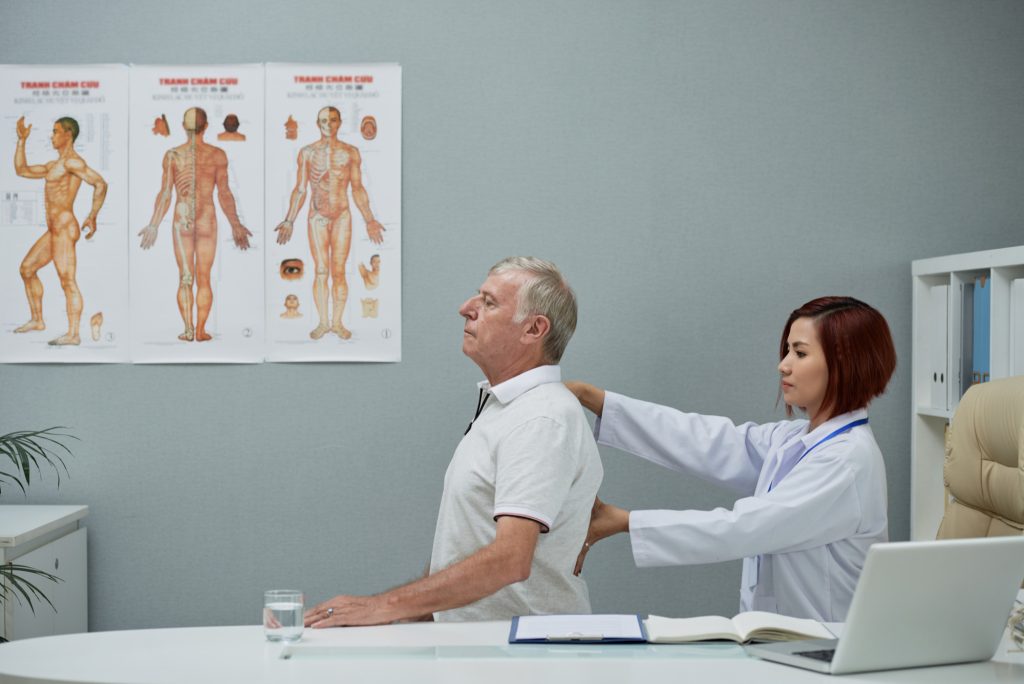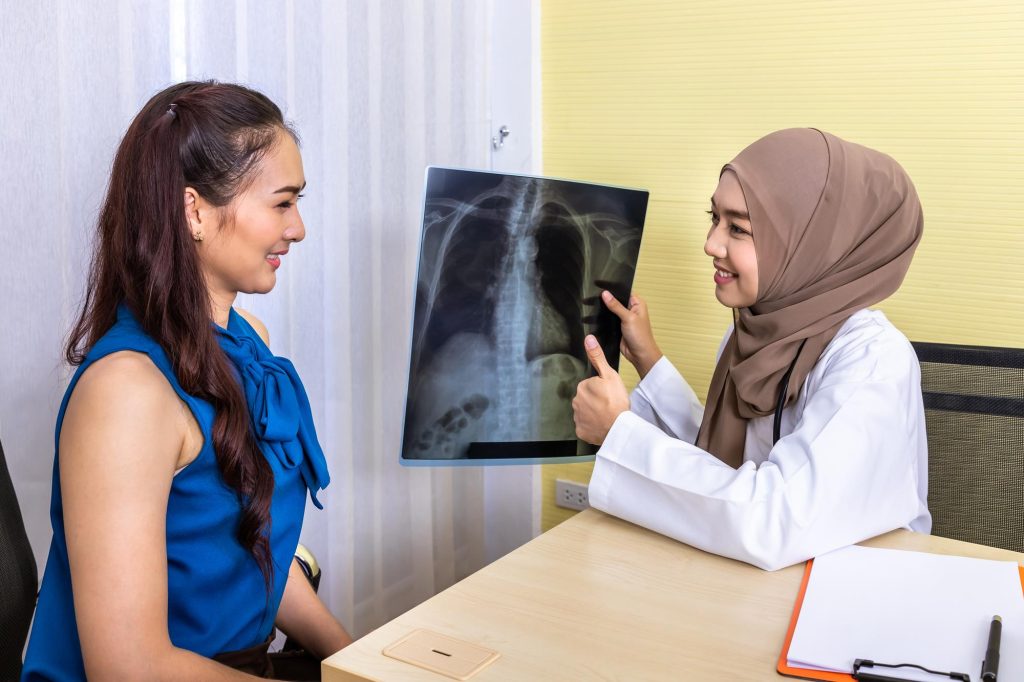Discover the importance of osteoporosis screening and whether it is necessary for you.
Should You Be Screened for Osteoporosis?
Osteoporosis. It’s a big word, but what does it really mean? And more importantly, should you be screened for it? Let’s dive into the world of brittle bones and find out if you should be wearing that fancy hospital gown anytime soon.

Understanding Osteoporosis
So, first things first. What is this osteoporosis thing anyway? Well, my friend, it’s a condition where your bones become weak and brittle. Think of them as the delicate porcelain teacups of your body. One gentle tap, and they might shatter into a million tiny pieces.
But why is this even a big deal? I mean, aren’t bones supposed to be strong and sturdy? Well, yes, they are. But when you have osteoporosis, your bones lose density, making them prone to fractures. And trust me, nobody wants to end up with a broken bone (unless you’re auditioning for the role of a pirate, maybe).
Now, let’s dive a little deeper into the fascinating world of osteoporosis. Picture this: your bones are like a bustling construction site, constantly being built up and broken down. It’s a delicate balance, like a dance between the demolition crew and the construction workers. But with osteoporosis, this dance becomes a bit chaotic. The demolition crew starts going on a rampage, breaking down bone faster than the construction workers can rebuild. And that’s when trouble starts brewing.
What is Osteoporosis?
Osteoporosis is not just your average “oops, I tripped and fell” kind of situation. It’s a chronic condition that affects millions of people worldwide. It’s like having a secret ninja lurking in your bones, weakening them from the inside. Sneaky, right?
But fear not, dear reader! Knowledge is power, and being aware of osteoporosis is the first step towards protecting yourself. So strap on your warrior boots, and let’s learn how to fight back!
Now, let’s take a closer look at the culprits behind this bone-weakening condition. One of the main villains is a sneaky little hormone called estrogen. Ladies, listen up! Estrogen plays a crucial role in keeping your bones strong and healthy. But as you enter menopause, your estrogen levels take a nosedive, leaving your bones vulnerable to the ninja-like attacks of osteoporosis.
The Impact of Osteoporosis on Health
Osteoporosis doesn’t just give your bones a hard time. It can affect your overall health in ways you might not even imagine. You see, when your bones become weak, simple everyday activities can become a real pain in the neck (or spine, to be exact).
Imagine trying to lift your grocery bags, but your feeble bones betray you, leaving you with a fractured wrist. Suddenly, carrying a gallon of milk feels like bench-pressing a baby elephant. Not exactly the kind of superpower you were hoping for, right?
But it doesn’t stop there, my friend. Osteoporosis can also lead to loss of height and a stooped posture, giving you that “I’ve spent my whole life hunched over a laptop” look even if you’re fresh out of college.
Now, let’s talk about the silent dangers of osteoporosis. You might think that fractures are the only concern, but there’s more to this condition than meets the eye. Osteoporosis can increase your risk of developing a condition called kyphosis, also known as a dowager’s hump. This is when your upper back curves forward, giving you a hunched appearance. Not only does it affect your physical appearance, but it can also lead to chronic pain and difficulty breathing.
Furthermore, osteoporosis can have a significant impact on your quality of life. Imagine being afraid to engage in your favorite physical activities because you’re worried about breaking a bone. It can be incredibly limiting and frustrating, robbing you of the joy and freedom that comes with an active lifestyle.
So, my friend, now that you have a deeper understanding of osteoporosis, it’s time to take action. Arm yourself with knowledge, make healthy lifestyle choices, and consult with your healthcare provider to develop a plan to keep your bones strong and resilient. Remember, you have the power to protect your bones and live a life free from the shackles of osteoporosis!
The Importance of Screening for Osteoporosis
Alright, so now that we know what osteoporosis is and how it can make your bones as fragile as a delicate soufflé, let’s talk about the importance of screening. Why on earth would you want to go through the hassle of getting screened for a condition you may or may not have?
Well, my skeptical friend, let me blow your mind for a second. Early detection is like finding a penny on the ground – it’s a tiny thing, but it could bring you endless luck. In the case of osteoporosis, early detection can help prevent fractures and other bone-related woes. Sounds pretty lucky to me!
Early Detection and Its Benefits
Picture this: You go for a screening and find out that you have the beginnings of osteoporosis. Scary, right? Well, not so fast. By catching it early, you have the opportunity to take steps to slow down the condition’s progression.
With the guidance of your healthcare provider, you can make lifestyle changes, like adding calcium-rich foods to your diet and incorporating weight-bearing exercises into your routine. It’s like giving your bones a superhero cape (but please, no capes outside of Halloween costumes).
Who Should Consider Screening?
Now, you might be thinking, “Alright, this all sounds great, but am I a candidate for osteoporosis screening?” Good question! While I can’t look through your bones like Superman’s x-ray vision, there are some factors that can increase your risk of developing osteoporosis.
Here’s a quick checklist for you, my curious friend:
- Being over the age of 50
- Being a woman (sorry, ladies, biology can be a bit unfair sometimes)
- Going through menopause (ah, the joys of hormone fluctuations)
- Having a family history of osteoporosis (thanks, Mom and Dad)
- Being a couch potato (I mean, who needs exercise when you have Netflix?)
If any of these apply to you, it might be a good idea to walk your fabulous self into that screening room.
The Screening Process for Osteoporosis
Okay, okay, you’re willing to take the leap and get screened. But what can you expect during this bone adventure? Will there be lasers and dramatic music? Hmm, probably not. But there’s still plenty to know!
What to Expect During Screening
First things first, you won’t need to wear a spandex suit or a cape (unless you’re into that sort of thing). Just come as you are, my friend. You’ll sit comfortably while a machine called a dual-energy X-ray absorptiometry (DEXA) scanner works its magic. No magical creatures involved, unfortunately.
The DEXA scanner will measure your bone density, comparing it to that of an average healthy person of your age and gender. It’s like finding out where you stand on the bone strength scale. Exciting, right?
Interpreting Your Screening Results
So, you’ve gone through the screening process, and now you have those precious results in your hands. But what do they even mean? Fear not, my friend. Your healthcare provider will be your trusty guide in decoding all those numbers and making sense of what they mean for your bone health.
They may use words like “T-score” and “Z-score,” but trust me, it’s not as scary as it sounds. It’s more like deciphering the secret code to a treasure map that leads you to stronger bones. Arrr, matey!
Prevention and Treatment of Osteoporosis
Okay, so you’ve been screened, and you’ve got the lowdown on your bone health. Now what? Well, my friend, it’s time to roll up your sleeves (or pant legs, if you prefer) and take action against osteoporosis.
Lifestyle Changes for Osteoporosis Prevention
You know what they say: prevention is better than a broken bone. And it couldn’t be truer when it comes to osteoporosis. There are simple lifestyle changes you can make to give your bones the love and care they deserve.
First, let’s talk about everyone’s favorite thing: food. Calcium and vitamin D are like the dynamic duo for bone health, so make sure to eat foods rich in these nutrients. Think milk, cheese, leafy greens, and, of course, chocolate—because who says bone health can’t be delicious?
In addition to a calcium-rich diet, regular exercise can work wonders for your bones. Weight-bearing exercises like walking, dancing, and—brace yourself—jumping on a trampoline can help maintain bone density and improve balance. Plus, who doesn’t love an excuse to bust a move?
Medical Treatments Available for Osteoporosis
Now, let’s say you’ve done everything right—ate your veggies, did your dance moves, and even took up yoga to find your inner zen. But alas, your bones still need a little extra help. That’s where medical treatments come into the picture.
There are several options available, like bisphosphonates, hormone therapy, and even injections that can slow down bone loss and reduce the risk of fractures. Think of them as your bone’s personal bodyguards, ready to fight off any villainous fractures that might come your way.
Making the Decision: Should You Get Screened?
Alright, my friend. We’ve reached the moment of truth. You now have all the information you need to make an informed decision. To screen or not to screen, that is the question.

Assessing Your Risk Factors
Take a moment to reflect on your risk factors. Are you over the age of 50? Are you a woman? Do you have a family history of osteoporosis? If any of these key factors apply to you, it might be worth considering a trip to the screening room.
Remember, knowledge is power, and being aware of your bone health can help you take control of your future. So put on your detective hat and assess those risk factors.
Discussing Screening with Your Healthcare Provider
Before you make any final decisions, it’s always a good idea to have a chat with your trusty healthcare provider. They can help evaluate your individual situation and guide you in making the right choice.
Your healthcare provider is like your wise sage, armed with all the knowledge of the medical world. They can answer any lingering questions you might have and provide personalized advice based on your unique needs.
In Conclusion
So, my friend, should you be screened for osteoporosis? The answer depends on you. Evaluate your risk factors, have a chat with your healthcare provider, and remember, knowledge is power when it comes to your bone health.
But fret not, even if you find yourself donning that fabulous hospital gown, it doesn’t mean it’s the end of the world. With early detection and proper care, you can pave the way to stronger bones and give osteoporosis a run for its money.
So go forth, my bone-loving friend, and take charge of your health. Your bones will thank you for it!







Your article helped me a lot, is there any more related content? Thanks!
I don’t think the title of your article matches the content lol. Just kidding, mainly because I had some doubts after reading the article.